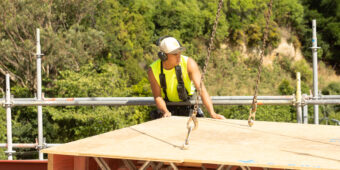Private building consent authority promises faster approvals for builders
05 Jun 2025, Industry News, News, Regulation

Share the post "Private building consent authority promises faster approvals for builders"
Building Consent Approvals Limited will become the country’s first private company accredited to issue building consents – and promises to deliver consents within 10 days
Building Consent Approvals Limited will become New Zealand’s first private company to issue building consents after it was granted accreditation by International Accreditation New Zealand (IANZ), following rigorous assessments to ensure compliance with the Building (Accreditation of Building Consent Authorities) Regulations 2006.
This move aims to alleviate the bottlenecks faced by builders due to delays in the traditional council-led consenting process. Historically, building consents have been the domain of territorial authorities, with only Kāinga Ora’s Consentium operating as a non-council Building Consent Authority (BCA) and only for public housing projects.
The traditional consenting process has been criticised for its delays, with an Auditor-General report revealing that only three of 67 councils meets the statutory 20-day timeframe for processing consents. In Auckland, the average processing time extends to 55 working days – including the time a building consent is on hold while the BCA waits for the applicant to response to a request for information (RFI).
A BRANZ external research report ModelDocs: Transforming building consent behaviour for better housing found that the reason for long actual timeframes was largely due to incomplete documentation and subsequent applicants’ slow response to RFIs – 86% of which were related to applicant behaviour. For example, in Auckland, each building consent application generated 2.5 RFIs, with 30 sub-line items requiring a response.
Rigorous assessment continues
While it was reported that Building Consent Approvals Limited is now able to process building consent applications, inspect buildings during construction, issue Code Compliance Certificates and Notices to Fix, on 10 June 2025 MBIE clarified this is not yet the case.
“Building Consent Approvals Limited’s application to be registered as a standalone building consent authority was conditionally approved by the Ministry of Business, Innovation and Employment on 24 May 2025,” said Simon Thomas, Head of Building System Delivery and Assurance, on 10 June 2025. “Those conditions have not yet been met, meaning BCAL is not registered.”
Part of the rigorous assessment by MBIE was ensuring the company would be able to cover any civil liabilities that may arise in performing consenting functions.
As per the Building Performance website, any application “must demonstrate adequate means for the full limitation period (10 years from the date of an act or omission by the BCA as specified by section 393 of the Act)”.
Building Consent Approvals Limited’s Chair, Tony Sewell, told RNZ that the business had civil liability covered and was in a position to cover any issues if they arise. The company plans to commence operations in June, focusing initially on single-story residential projects for large developers, and aims to process consents in 10 days.
Talking to The Press, Sewell specified that the company is “not interested in complicated architectural builds”.
“We can do the simple stuff, and that will free up the councils for the more complex applications,” he said. “It’s the low-hanging fruit, and there’s a lot of it.”
However, the reintroduction of private consent providers has raised concerns among some industry stakeholders. John Gray, president of the Homeowners and Buyers Association, told RNZ that he was concerned the move could repeat past mistakes from the 1990s unless private consenting authorities carried significant insurance.
“It did not work then and it will not work now, unless they get competent people,” he said. “And most importantly, those private certifiers [need to] have mandatory insurance to back them for their failures.”
The government’s broader reforms to the building consent system include introducing a self-certification scheme for qualified building professionals undertaking low-risk residential work. This initiative seeks to reduce the burden on BCAs and empower trusted professionals to certify their own work, further streamlining the construction process.
Over the next few weeks we’ll publish a series of articles on this topic, including the history of the concept, further details from MBIE, and feedback from councils and homeowners.
Register to earn LBP Points Sign in
1 Comment
Leave a Reply
You must be logged in to post a comment.




If this article’s assertion that BRANZ has identified the primary issues regarding slow consent times as the fault of the applicant (incomplete documentation, slow responses to RFI) and not the Approving Body is correct, then how is this new company going to improve times? As the Chair mentioned, they’re after “low hanging fruit”, to help them hit their 10-day guarantee I imagine. However, if these sorts of applications are that easy to deal with then I imagine Councils don’t have much problem with them either. A private company will seek work that maximises their profit, and not necessarily assist in the reduction of approval times (assuming their applicants play ball) if that path does not achieve that aim.
More broadly, I’m concerned that the introduction of private certifiers and self-certification schemes will be the thin end of a wedge that ends up with the situation I see while working in the construction industry Australia now, a mess of poor construction, loose oversight, and ineffectual regulation. I could throw a stone out my window now and hit someone who is either in litigation with a builder or knows someone who is or has had issues.
The best thing about NZ’s system is that the average homeowner, who knows nothing about construction, has very good protection through the established consenting process, licencing schemes such as LBP, and pretty clear recourse if things do go wrong. Changing this system to reduce a 55 working day (for Auckland at least) average for consent approvals is fraught. Where I currently live, NSW Australia, State averages for assessing Development Applications is over 100 days. This time frame doesn’t allow for the Construction Certificate, which is generally the next stage of the process that must be completed before construction can start. Don’t break something that really isn’t that broken.